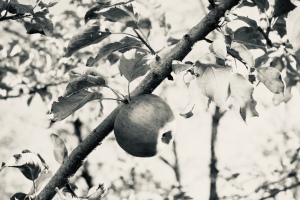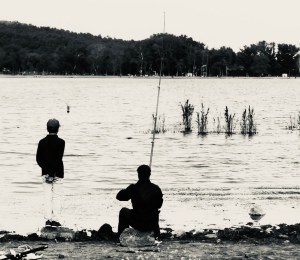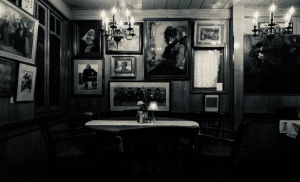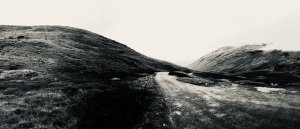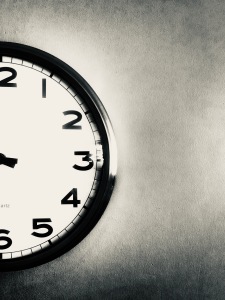my mother used to warn me as a child: don’t swallow the pips.
‘why?’ i would ask.
‘because a tree will grow inside you.’
but i laughed. it was just one of those things mother said. like: your face will get stuck forever if you pull an ugly face when the wind blows. just a warning to tease kids. a bit of fun. no truth to it. so i would eat my apple. usually a cox’s orange pippin. nice and sweet. juicy.
skin.
flesh.
stalk.
core.
pips.
a tree never grew. no matter how many times i did it. my stomach digested it. the acid inside. the fluids. breaking everything down to nutrients. waste. converting to energy. to be used by the the body.
i grew up. became a school kid. primary. secondary. young adult. then onto college. such tales discarded. forgotten. there were more important things. girls. cigarettes. alcohol. music. clothes.
i left college with a passable teaching degree and a job in the city. the city. the only city. london. a sprawling mess of towns joined by a tube network. i spent term time focused on my work and career. played the weekends hard.
it was my habit to return for a week to my mother’s house in the summer. to that country town. in the heart of somerset. not because i liked it. i loathed it. the town. the people there. the narrow minds. the slow ways. it was an obligation. an obligation that i reduced down over the years to one week in summer.
we would sit in the large back garden taking in the sun. sat in rusting garden chairs. cool lemonade to hand. talking about things but not talking. this would last three or four days then i would get restless. the walls of the house and garden confining. suffocating. bearing down with their weight. what was to be said had been said. so i would take off. small pack on my back. four cans of beer. sandwiches. pack of crisps.
i would set off down the road. past the tin topped houses. bridge over the river. take a right. follow the road. through the new estate. along the lane then the woods. the edges of quiet. a few dog walkers and children. further still. to the country road. pick a direction. set off and see what i would see. small villages and houses. arches made from over hanging trees across long winding roads. take a swig from a can as i went. a bite of sandwich. enjoying the company of one. the solitude. the silence. on i would go. until the beer ran out. then i would turn. head home.
it had been a busy year. ofsted. the sudden departure of the head. stupid bitch shouldn’t have left her password on the computer. my promotion. the reorganisation of the school. the right people in place. my weekends had got wilder to escape the pressure. half-remembered nights followed by waking up in someone’s bed. a bleary-eyed return to my flat. yesterday’s clothes. a shower. a snack. then out to do it all again.
so the week away in the summer came as a real break. a break to the pace. the self-destruction. a chance to slow. be still. so we sat. mother and i. in the back garden. sipping lemonade during a particularly hot summer. wasps buzzed around. the air hazy. the soil cracked. grass dry. parched. we talked without talking. then nothing. just the heat. the lemonade. the beat of the sun.
one night the sky cracked.lightning bolts. the pound of rain. i sat up. watched. a blessed relief. the bed had been hot. clingy. this brought coolness. a change. tomorrow. i decided. i would go on a walk.
i got up early. four cans in the pack. cucumber sandwiches. packet of crisps. and i was off. down the road. past the houses. over the river. take a right. estate. lane. through the woods. into the country. follow a road.
i had eaten the sandwiches and crisps a while back. and was on my third can of beer when i entered the village. it was unfamiliar to me. more a hamlet. consisting of a few houses and a pub. the black sheep. i wondered how it had lasted there so long with so few customers. but the country was like that. there was always something without explanation. that you couldn’t understand as city folk. and i now considered myself city folk.
like the house at the end of the hamlet. larger than the rest. too large for such a place. with high grey bricked walls surrounding the garden. it made me wonder what it had to hide. to protect. then i saw it. a large apple tree.
just poking over the height of the wall. full with large red apples. so many. some were hanging down. almost within reach.
i finished the third can. looked up at the apples. my stomach felt empty despite the drink. i needed something. a memory of apple scrumping with school friends came back to me. it never did any harm. just the one. the tree had so many. who would notice? i glanced along the road. no cars. no people. i reached up. finger tips grabbing the end. twisted and pulled. it came away. the branch sprung back.
‘oi!’ came a cry.
it was an old man. in green. through a gate.
‘give back that apple.’
but i laughed. feeling eleven again. and ran. the old man trying to catch up. but i was younger. fitter..
‘you mustn’t’ came the cry as i left him.
i glanced behind me. no old man. no hamlet. just the woods ahead. i would drink the last can. then the apple. my treat.
the trees towered overhead. sun filtered through the leaves onto the forest floor covered in brown pine needles. the occasional stump. not a sound was heard except the odd branch disturbed by the movement of a bird or something else. i threw the empty can away. turned my attention to my ill-gotten gains. one apple. what a fuss over one apple. when there were so many. so so many. stupid old fool. i bit into its red skin. into its juicy flesh. it was sweet. juice dribbled down my chin. i wanted the all of it. every piece. the stalk. the core. the pips. none must be wasted. it was too good.
my apple consumed. i set off further into the woods. past the trees. towering overhead. the rustle of birds. dappled light searching. there was a stab of pain in my stomach. sharp. piercing. stopped me in my tracks. another. sharper. it bent me double. skin clammy. face wet. pains down my legs. into my feet. sharp. cutting.
my shoes seemed to press against my feet. shoes too small. tight. my feet hot. burning. i had to get my shoes off. now. i fought the pain in my stomach. untied the laces. shoes off. socks. to see my feet. at first nothing. as i stood bent. just pale pink flesh. toes. nails.
a flash of heat. then a change to the skin. darkening. browning. thickening. the nails on my large toes split. divided. fell off. a terrible. my remaining nails popped. then thin. brown tendrils. burst through the skin.
like teeth through grapes. brown tendrils twisting to the ground. into it. a few at first. then more. hot burning pain in my feet as roots burst through my heels. then all sides. into the ground. i scream.
skin thickening all over. i try to rip my shirt off. but my skin is thickening. tightening. compressing. i find it hard to breathe. i try to gasp for breath. but i can’t breathe. i can’t breathe.
hell. i can’t move. i’m stuck here. stuck. a hot burning sensation in my head. like someone stabbing with blades.
then the burning stops. and silence. just me. alone. in the woods. unable to move. the silence. a bird overhead.
i can just see. a figure. a figure in green. he’s holding something. an axe. he’s holding an axe.
‘they never learn.’
and. i can’t scream.
Category Archives: Family
moment 23
i left the house. needed to get away. on my ten speed, blue with silver. through the quiet traffic. across town. anywhere. just not there. down the path by the red brick youth club. stream running nearby. follow the stream. across the bridge over the weir. a moment to watch the water tumble and fall. a froth of white turbulence. across I went. no cycles allowed. on-wards into the park with the river running through it. i came upon my stepfather and friend. fishing. watching the bobbing of the float cause ripples on the water. enticing. i took the fishing rod, metallic blue, bottom of the range. a finger resting, watching the line. waiting. the fluorescent float bobbed. then disappeared. up again. then down. a fish biting. a hook cutting in. i wound the reel, pulling occasionally. wound him in. the line straight and taught, heavy. i pulled and wound, pulled and wound. the hook caught. up to the bank. up into the air. the fish thrashing, twisting, spinning on the line. i brought it into shore, on the grass of the bank. its rainbow colours hinted of deep magical places in the sunlight. of freedom in the green reeds, along the beds of the river. the caress of the current on scales as it ran along the body. a never-ending world. i watched as the fish gasped for freedom. its mouth opening and closing in the air. too much oxygen. open. close. open. close. hook through lip. i bent down and carefully removed the hook. carried the fish, in the sun, gleaming, to the sparkle of the river. lay it down on the water. watched it swim free. i left the rod on the bank, said my goodbye to my stepfather and friend. cycled slowly home. through the sleepy traffic of the town. up the hill past the tin topped house. to my door. i opened it quietly. went into the lounge. the rabbit was dead.
moment 21
the son sat in the bar sipping his prosecco. he hated it here. the place smelt of damp dogs, wet people and two-day breath. why had he agreed to meet here? there were far better places. they could have met in the new artisan coffee house in town. great flat whites, free WIFI and young female barristas. here everyone was old. but then it had to be this place. he was more comfortable here. it was easier to say. waiting. he glanced at the menu of fish and chips, burger and chips, or steak. vegetarianism a thing of mystery. not even a lazy lasagne or penne pasta could be had. so he got another prosecco from the bar and a pack of stale ready salted crisps. that was lunch then. he stared at the bar a moment at the hopeful horseshoes hammered carelessly around the bar. and the collection of beer plates of ales they never had. what time was it? nearly twelve. he would be here soon. if anything was said of him, he was punctual. old school. no doubt, he would be dressed in shirt and tie, v-neck brown jumper, grey trousers and sensible shoes. he had worn the same for years. ever since he retired. it was a matter of duty. like collecting for the british legion, watching the queen’s speech, or buying the times. he was a man of timeless routine, of familiarity.
at precisely twelve, he came in, ordered a 1/2 of mild and sat opposite. this was it. the meeting. the important discussion they had to have, the son took a gulp of prosecco. what to say? how to say it? how do you say to a person it is time? so he just looked at him. waited. hoped he would say something first. nothing. he was always a man of few words.
“dad?”
“yes.”
“did you read it?”
“yes.”
“you know it’s for the best.”
“yes.”
“and?”
“it’s just the dog.”
“we’ll find it a good home. you know we would take her but, you know, the cats.”
“i know. it’s just…”
“yes.”
“it’s just I’ve had her so long. part of the family.”
“i know. it’s just there is no option.”
“i know.”
“just, you know. i’m working all the time. it’s for the best.”
“i know.”
“we’re thinking of you.”
“i know.”
“it’s just…”
“i know. just.”
moment 20
there was a break in the clouds as the rain changed from torrential hard and heavy to torrential light. they sat in the car chatting as mum, the driver, followed the voice of the SATNAV. they discussed the merits of square crisps. the SATNAV points to a pass with dire warnings of not suitable for lorries and avoid at winter. but they are city folk. they sat sipping prosecco as the carpet shop burned in the nights and youths ran from shops with bags of rice. they sat reading books as the drug gangs stabbed each other over a postcode. they sat sipping tea as buses exploded and bombs went off on the underground. the next day they shopped in town. how bad could it be? the road wound its way through green rocky hills, sheep crossing their path. grey stone in green with the littering of white forms too focused on the ground to give way to a car. the road narrowed into one. twisting L-shapes with occasional space where another could pass. maybe. please don’t let another car come. please leave the road free. high in the heart of cumbria they stopped to take a moment on her back. to admire the curves of her body. the rise and fall of many limbs that receded into the horizon. a photo opportunity with a sheep then onwards down a spiral of road, each turning a fall. they passed on the way the fallen travellers to potholes. hoping, wishing, begging they did not join them. they passed on the way pensioners in small cars going in the opposite direction they had been. if only they could call to them. if only they could cry a warning: don’t do it! but too late, they were gone. and so the road continued to twist, curling its form around the tyres, flicking its tongue at their wheels. just as they thought: this is it. the narrow winding pass came to an end and they saw a road.
moment 17
the second hand clicked slowly on crossing the white face of the clock. the black plastic hands told harold it was nearly two. he had been waiting an hour. an hour. and still no news. he sat staring at the blank white door in the blank wall. featureless. no clue there to guide him as to the outcome. no signage for him to lose himself in. if only there were a picture, a painting to pass the time in imagination. he could have lost himself in the colours. the swirl of brush-strokes. the splodges signifying something. a fleeting meaning of a moment, a thought, an idea. but all he had was a white door and worry. why hadn’t she let him go in with her? why the secrecy? what was she hiding? he knew in her way she was trying to protect him but this was worse. the unknowing. all she had said was ‘lady problems’ and left it at that. but that said nothing. she had always been like that. keeping everything to herself. like the time she had her wisdom teeth out. he had known nothing about it until she had come home, had soup for dinner and was barely able to speak. he could have done something. held her hand. said soft words to smooth the pain and fear away. like he had tried with the birth of their daughter. words of encouragement. the damp cloth to the brow. holding of hands, tight, feeling the clench of pain. trying to draw it from her, to will it less. but not this time. not now. today she was alone in that room. without him. maybe he was selfish. maybe he just wanted his fear to go, to be elevated. the pounding in his chest to go down. the hundreds and millions of whispering disasters to die away to nothing. for all to be calm as they sat there. he was probably making a fuss of nothing. he did that. he would imagine a terror where there wasn’t one. he just had to be patient and wait. that was his role: to wait. so he sat and looked at the clock. the white clock on the white wall. it said five past two.
cleaning woman

It was the towel that did it.
Karen returned home to her bungalow at quarter past six.This was her usual time after cleaning the offices in the evening. A day spent wiping down the surfaces of the food preparation areas. Scrubbing at stubborn coffee spills on counter tops. Vim usually did the trick for that problem. Vacuuming the coarse office carpets. Often in colours no respecting householder would have. Dingy greys, dark blues, grass greens. The toilets were always the worse. Particularly the executive loos. Maybe it was some sort of power play or a case of ‘because they could’ but the floors around the bowls were always covered with pee and carelessly discarded tissue. She really had to work her magic there to get rid of the smell and yellow tell-tales.
Karen trudged through the open front door stepping over her husband’s discarded jacket on the floor. Precisely where she had told him numerous times not to leave it. She picked it up and put it on the nearby coat peg.
She carried the bags of shopping through to the kitchen. He was there at the cooker frying. She watched as egg, sausage and bacon spat fat up the wall of tiles around the oven. Each little spit landing and leaving a yellow mark. Hanging there at first then gradually making a trail down the wall towards the surface of the hob where it rested satisfied. A mark of defiance. Defiant at her cleaning. The hours she had spent scrubbing those tiles white last week. The toothbrush she had used dipped in the best bleach then worked into the grout between each tile. The only way. All gone. All lost. Lost to the sizzling spit of a frying pan.
Karen left the shopping by the kitchen table to be sorted later. Made her way to the bedroom. Worn and unworn men’s clothes littered the bed and floor. A battlefield of linen. Reds, blues, greens intertwined with each other. Day used socks and sweaty underpants slept on her pillow. He was always such a dirty man. Unclean. She wondered what had attracted her to him in the first place. He had turned up at their date in a crumpled dark suit, crumpled shirt, crumpled tie. Unpolished shoes. Maybe she felt he needed looking after. That she was the one to do it. A challenge to be taken on. Or was it just to annoy her parents. Knowing his long hair and t-hs dropped for fs would be an a-front to their prim and proper ways. Whatever it was, they were married a year later and she set about trying to train him.
She left the bedroom. Went next door. Her favourite room of the house. She had insisted on the decor. It was her non-negotiable. A fashionable free standing bath. A wide white basin with victorian taps. A wooden bench on which rested three scented candles. Dimmable lighting to set a mood. Tiled flooring with heating. Her sanctuary. But it had been defiled. Again. Two used white, wet towels lay on the floor. In the middle. In the middle of her room. Her place. The clock work in her mind clicked another notch. The final notch. Rang the bell.
Karen made her way back to the kitchen. He was sat at the table eating his fry up. Bacon, eggs, sausages, fried toast. The frying pan had been dumped on top of the pile of washing up in the sink. She lifted it up. Turned around. Hitting him hard on the head. Metal against bone. There was a crack. He slumped in the chair.
He was always a slip of a man. So it was easy work dragging him from the kitchen to the bathroom. She looked with disgust at the trail of blood along the carpet. But she knew she had a fluid that would sort that out. She stripped him of his oil stained jeans and t-shirt. Damn that garage. And with a mighty heave, practised from lifting large vacuum cleaners up flights of stairs, she got him in the bath.
She put in the plug and turned on the mixer tap. Something nice and warm. She fetched the large container of bleach from the cupboard under the stairs. Pilfered from work. There had to be some perks. She emptied the 5 litre bottle into the bath. Watching the gentle trail of the thick liquid hit the water. His skin. She would teach him how to be clean even if it killed him.
She turned off the taps. It still wasn’t enough. He still looked grubby and dirty laying in the bath. Her bath. Something more was needed. Something to get him really clean. She went back to the cupboard under the stairs and lifted down the brush from the shelf. The steel wire brush. The one she used to clean the bottom of blackened pans. That would do the job.
She set to his skin. Scrubbing furiously. Scrubbing as if he were the pissed stained floors of the executive loos. The coffee marked surfaces of the food counters. The tiles in the kitchen. The bath water turned red. She ignored it. She was doing good. Getting the grime away. The years of fried food, engine oil. Dirt on her clean sheets. A late night hand feeling for her arse leaving fingerprints. He was always so grubby. She scrubbed away.
She pulled the plug and watched as the dirty water receded. A gradual reveal of her handiwork. A pinkish rim was left around the bath marking where the water had been. That would take some sorting but it had been worth it. She had finally taught him how to be clean to the bone.

